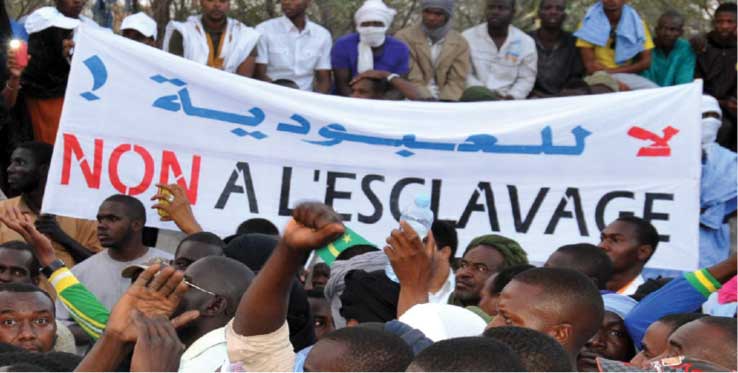
In 2016, we submitted to the UN Mechanisms 21 communications regarding 7 individuals.

MAURITANIA
 Our Concerns
Our Concerns
- Judicial harassment of human rights defenders, in particular anti-slavery activists;
- Lack of willingness or effective public policy to definitively eradicate slavery;
- Inhumane conditions of detention and systematic use of torture;
- Unwillingness to address the most serious human rights violations;
- Lack of independence of the National Human Rights Commission.
 Recommendations
Recommendations
- Put an end to reprisals against human rights defenders, especially anti-slavery activists;
- Implement international human rights treaties and ensure national laws are in conformity therewith;
- Ensure detention conditions comply with the UN Standard Minimum Rules for the Treatment of Prisoners;
- Ensure the independence of the NHRC and improve the effectiveness of its complaint mechanism.
 Upcoming
Upcoming
- January 2017: Publication of the report of the Subcommittee on Accreditation of the National Human Rights Commission;
- March 2017: Presentation of the report of the Special Rapporteur on torture to the Human Rights Council on his visit to Mauritania;
- 31 May 2017: Submission of Mauritania’s third periodic report to the Committee against Torture;
- June 2017: Presentation of the report of the Special Rapporteur on extreme poverty and human rights to the Human Rights Council on his visit to Mauritania;
- 1 November 2017: Submission of Mauritania’s second periodic report to the Human Rights Committee;
- 3 November 2017: Three-year delay in the submission of Mauritania’s initial report to the Committee on Enforced Disappearances.
In 2016, President Mohamed Ould Abdel Aziz declared that he was willing to amend the Constitution. The opposition has, however, denounced this revision, considering it as an attempt by the President to modify the Constitution in order to be able to run for a third term in office. On 29 September 2016, a 10-day national dialogue – involving 450 individuals – was launched in order to discuss the potential changes to the Constitution. Following the dialogue, the President announced that he would not modify the two-term limit and that a constitutional referendum would be held in 2017.
In May 2016, Philip Alston, the United Nations Special Rapporteur on extreme poverty and human rights, visited the country and highlighted several issues, including the persistence of slavery, despite its abolition in 1981 and its criminalisation in 2007. In 2016, the Global Slavery Index estimated that approximately 43,000 people in Mauritania – equivalent to 1.06% of the country’s total population – were living in conditions of either modern or traditional slavery. In May 2016, two individuals were sentenced by the newly established specialised criminal courts on slavery; however, the practice still persists. The numerous testimonies of reprisals against anti-slavery activists received by Alkarama show that this remains a contentious issue in the country.

Crackdown on human rights defenders and anti-slavery activists
Throughout 2016, human rights defenders, particularly anti-slavery activists, continued to face reprisals and were frequently subjected to judicial harassment. Despite the release of two activists, Biram Dah Abeid and Brahim Ould Bilal Ramdane, on 19 May 2016, a group of abolitionist activists were arrested and prosecuted less than two months later. In early July 2016, 13 members of the Resurgence of the Abolitionist Movement Initiative (IRA) were arrested for allegedly participating in a demonstration against the forced eviction of Haratine inhabitants in a Nouakchott’s neighbourhood, during which violent clashes erupted. Alkarama sent an urgent appeal to several UN Special Procedures, calling on the authorities to release them immediately and to drop all charges against them. Yet, on 18 August 2016, they were sentenced to heavy prison sentences, ranging from 3 to 15 years, on the basis of confessions extracted under torture and following a manifestly unfair trial.
On 19 October 2016, a group of seven UN experts issued a press release, in which they considered the aforementioned prosecutions to have been “politically motivated”. They further stressed that the Mauritanian authorities, known for their hostility to criticism from civil society, were even less tolerant towards groups like the IRA “whose members are from the Haratine minority and who work to promote the end of slavery”.

The persistent issue of torture and ill-treatment
From 25 January to 3 February 2016, the UN Special Rapporteur on torture, Juan E. Méndez, made his first official visit to Mauritania to assess the situation regarding the use of torture and other cruel, inhuman or degrading treatment. As emphasised in a note sent to the Special Rapporteur by Alkarama prior to his visit, the main challenge in this regard, is the lack of effective mechanisms to prevent as well as investigate cases of torture. Following his visit, the UN expert echoed these concerns, noting that “the safeguards against torture and ill-treatment are in place, but they don’t work”. He emphasised, in particular, the absence of investigations into allegations of torture and the lack of forensic medical expertise. Furthermore, he found the living conditions of detainees to be inhumane and urged the authorities to bring their detention practice in line with international standards.
The use of torture to obtain confessions, which will subsequently be used in unfair trials to guarantee a conviction, remains a primary concern. The case of Yaya Cissé, a Malian national arbitrarily detained and sentenced to death following an unfair trial and on the basis of confessions obtained under torture, is a clear illustration of this phenomenon. In October 2016, Alkarama seized the Working Group on Arbitrary Detention of the case in order to call on the Mauritanian authorities for his immediate release and to guarantee the right of every accused person to a fair trial, especially by excluding any evidence obtained under torture.
The visit of the UN Subcommittee on the Prevention of Torture and other Cruel, Inhuman or Degrading Treatment or Punishment in October 2016, following Mauritania’s ratification of the Optional Protocol to the UN Convention against Torture was thus particularly welcomed by local civil society. The experts assessed, among others, the work of the National Human Rights Commission (NHRC) in charge of establishing the National Preventive Mechanism (NPM) against torture, entitled to visit detention facilities throughout the country. The experts noted that the NPM, established in 2016, faced major challenges, especially in terms of funding and independence.

Lack of independence of the National Human Rights Commission
In 2016, Alkarama contributed to the review of the NHRC by the Subcommittee on Accreditation (SCA) of the Global Alliance of National Human Rights Institutions, which was held in November. Following a consultation process with numerous local activists, Alkarama submitted a report, co-signed by eight Mauritanian human rights NGOs, in which it highlighted numerous concerns. In particular, it stressed the lack of independence and transparency of the NHRC.
While the NHRC was reformed in 2012, its independence remains questionable in practice, as it reports directly to the executive. The latter also controls the appointment of its members, systematically excluding the most active and critical human rights NGOs from the nomination process, without any justification. In April 2016, several NGOs issued a public statement in which they denounced the opacity of NHRC’s designation process.
Alkarama observed that the NHRC has failed to gain the confidence of the vast majority of organisations working on sensitive topics such as slavery, torture, and arbitrary detention, having never publicly addressed these issues since its establishment. Local organisations in particular have denounced the NHRC’s alignment with the official position of the authorities, as it affirmed that slavery had been “eradicated” and congratulated security forces for not using torture, blatantly ignoring the numerous cases of torture documented in the country.
In light of these developments, Alkarama finds that the NHRC does not fully comply with the Paris Principles and is therefore unable to play the role expected of an institution granted the “A” status. As a result, Alkarama made eight recommendations directed at enhancing the independence of the Commission, restoring civil society’s confidence in it, improving the effectiveness of its complaint mechanism, and taking a more critical approach towards the government. In January 2017, the SCA will publish a report assessing the independence and efficiency of the NHRC following its review.
